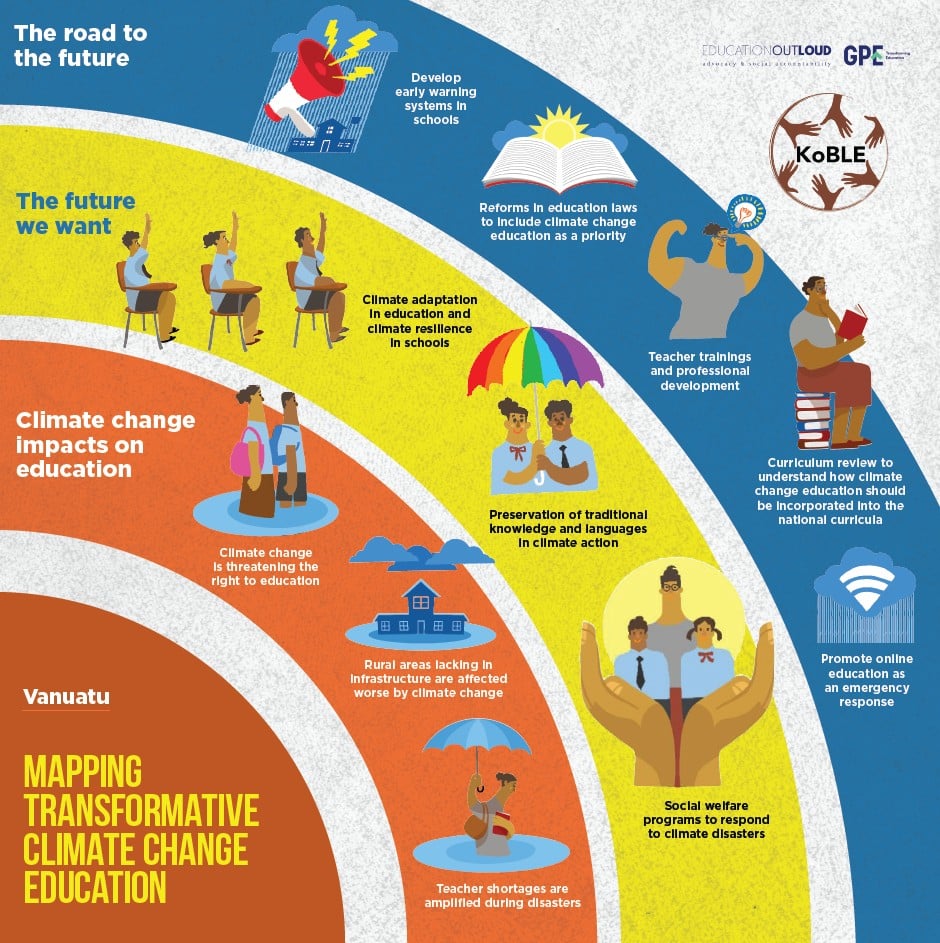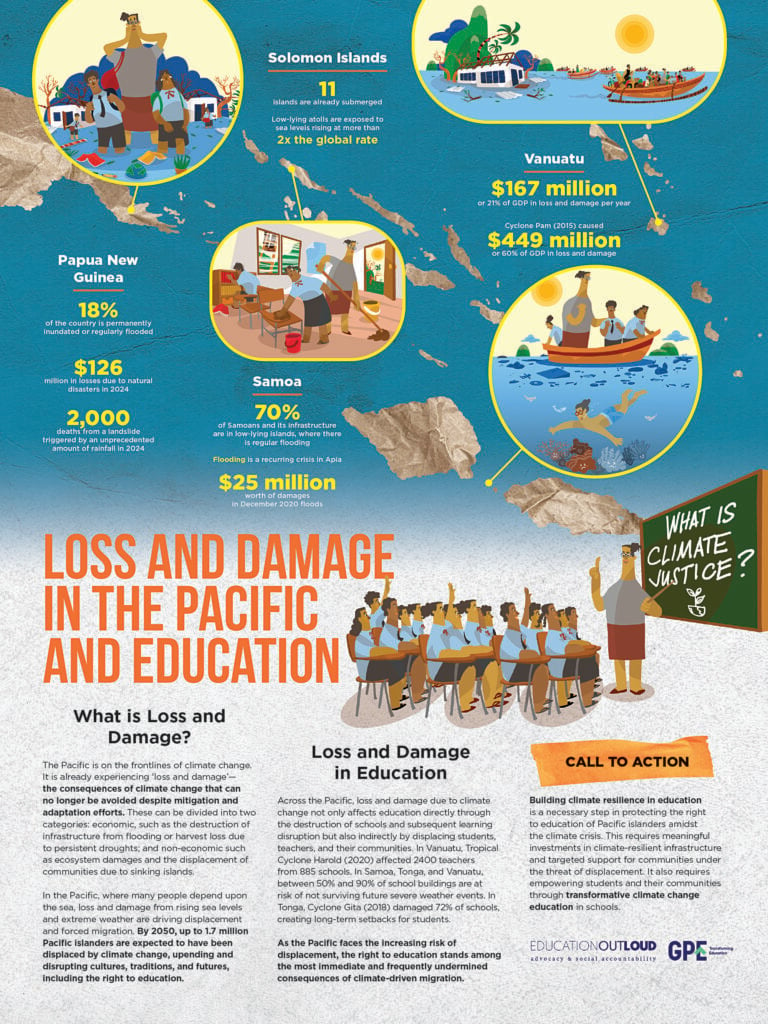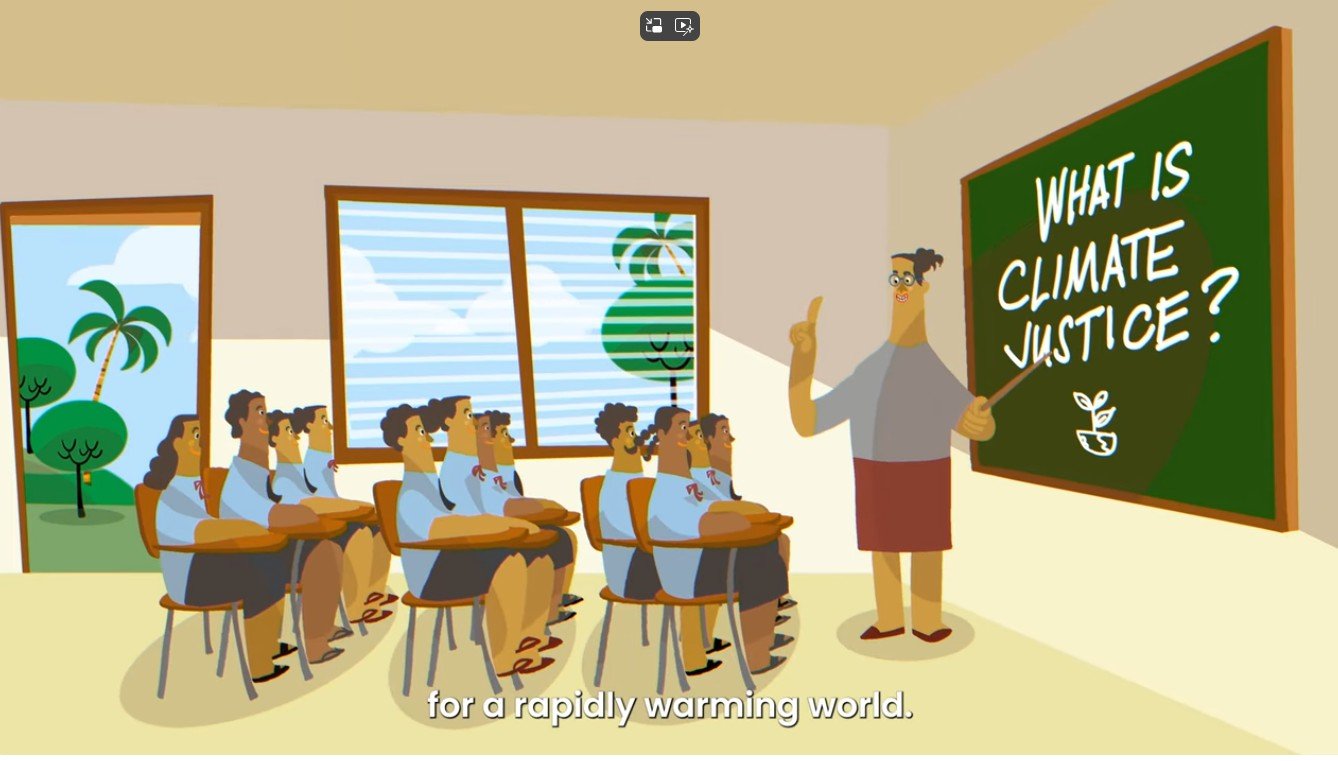
Building Resilience through Climate Change Education in the Pacific
Rising sea levels and extreme weather events are displacing communities, damaging critical infrastructure, and endangering food security. Amidst these mounting challenges, education is being tapped to not only build climate resilience but also empower students to navigate a world that is increasingly being shaped by the climate crisis.
In this article, Alanah Torralba, Learning Partner and Just Transition Specialist, explores the potential of climate change education in strengthening the capacities of students, teachers and communities to drive meaningful action today. In doing so, Pacific Islanders are laying down the foundations of a sustainable and just future.
At the Boera Primary School, a school with more than 400 students in the Central Province of Papua New Guinea, students and their communities are feeling the effects of climate change in their daily lives. Boera is located on the edge of the sea and is at risk of sinking due to rising sea levels. Students, teachers, and community members are increasingly concerned, with the village already exhibiting signs of impending destruction.
“And sometimes it becomes so hot that we cannot send the children to outdoor activities. We are in the dry season, but it is too dry. Now is when we really feel (the climate change, red.),” said teacher Andrea Pokiton. In the summer, a prolonged drought was affecting water supply and worsening the already challenging classroom conditions, with infrastructure unable to withstand extreme weather and slow-onset climate impacts.
According to UNICEF, climate shocks are posing a significant threat to the right to education worldwide. In South Asia, the most affected region in the world, 128 million students experienced climate-related learning disruption. Meanwhile, another 118 million from Bangladesh, Cambodia, India, Thailand, and the Philippines were affected by extreme heatwaves. Given that the majority of students suffering climate-induced schooling disruption are in low- and lower-middle-income countries, climate change also threatens to worsen the quality of learning and widen income and gender inequalities.
Education: A powerful tool in climate action
According to the World Bank, education is the most significant factor in raising climate change awareness. When students and their communities learn about climate change comprehensively, they not only become aware of the climate crisis, but they also shift mindsets and adopt sustainable behaviours. Climate change education can also spark innovation and empower students to become more active in civic activities related to climate action. It can also prepare students for emerging sustainable economies by learning critical green skills.
While education is a powerful tool for climate action, it is still overlooked. In climate finance, for example, only 1.5% has been directed to climate education, affecting the roll-out of vital climate education programmes in the world, according to the World Bank.
Globally, governments have been slow to implement climate change education programmes. In a 2021 UNESCO-led survey, while 92% of education sector plans and curricular frameworks mentioned environmental themes, most have done so superficially.
Climate change was rarely addressed in depth, with fewer than 20% countries showing moderate integration of climate change education. Moreover, climate change has often been subsumed into general subjects related to “the environment.” Meanwhile, one-third of surveyed teachers said that teacher preparation is insufficient, with climate-related content absent from pre-service and in-service teacher training.
For the Pacific Region, this means that while there is relatively high awareness about climate change among the public, an integrative approach in education regarding the climate crisis is lacking. It also means that education’s potential in building climate resilience remains untapped.
Towards a transformative climate education agenda in the Pacific



The climate crisis highlights the urgent need for resilient education systems and a shift in curricula to teach climate change more effectively. Despite the realities of climate change in the Pacific, the education sector is not yet being mobilised towards climate action. There are not enough resources being directed to climate change education, particularly for teacher professional development, the provision of up-to-date learning materials, and improving assessment systems and school infrastructure. In response, several national education coalitions in the Pacific region have started to prioritise advancing climate change education as a key focus of their advocacy efforts.
Among them are the Papua New Guinea Education Advocacy Network, Samoa Education Network, Kolisen Blong Leftemap Edukesen (KOBLE Vanuatu), and Coalition for Education Solomon – all Education Out Loud grantees. A total of four education coalitions along with the regional coalition ASPBAE have gathered through the Education Out Loud Learning Collaborative for Climate Transformative Education in Pacific to drive meaningful change and design strategies towards a climate change education agenda in the region i year 2025.
In Vanuatu, KOBLE is now engaging 30 civil society organisations within their coalition to discuss about climate change education and climate justice. PEAN in Papua New Guinea has planned conducting teacher training and education official awareness on climate education and is participating in various civil society events related to the promotion of safety in schools, including on heat stress in classrooms. COESI in the Solomon Islands has held discussions with their education ministry as well as stakeholders in schools about how climate change is currently being taught in schools. SEN in Samoa has held a debrief session among its members and shared their learning with other organisations as well as conducted a community outreach with youth and community.
Recognising that climate change education in the Pacific requires the allocation of dedicated resources, national education coalitions of the region plan to engage more deeply in advocating for a climate change education curriculum that is responsive to the needs and aspirations of students, teachers, and their communities.
The collaborative efforts have also generated practical learning resources that can be shared beyond the participating coalitions. These include a mapping of transformative climate education approaches and infographics on climate justice and the issue of loss and damage in the Pacific—tools that can support advocacy efforts across the region. In addition, a baseline assessment survey was developed to identify the skills, knowledge, and capacity-building needs of National Education Coalitions in relation to advancing climate justice within the education sector.
These outputs provide a foundation for strengthening climate education initiatives and can be utilised by other grantees and civil society actors committed to this agenda.
The Pacific Learning Collaborative on Climate Transformative Education
- The Pacific Learning Collaborative on Climate Education
is an initiative by Education Out Loud aiming to strengthen civil society leadership towards advocacy efforts on climate change education. - Through various activities including media development, online collaboration and an in-person workshop, key stakeholders and advocates from the Pacific
strengthened their capacities towards climate change education advocacy. - It also serves as a platform for sharing best practices
and engaging in thoughtful dialogue with students, teachers and community members about the alarming consequences of climate change for the education sector.
- Learn more about Climate Education
– Learning Interrupted: Global snapshot of climate-related school disruptions in 2024 (UNICEF)
– Greening Curriculum Guidance (UNESCO)
– Choosing Our Future: Education for Climate Action (World Bank) - The Pacific Learning Collaborative: Materials
– Baseline assessment survey on National Education Coalitions skills, knowledge, and capacity-building needs in relation to advancing climate justice within the education sector.
– Mapping of transformative climate education approaches Vanuatu, Samoa, Solomon Islands, and Papua New Guinea
– Infographics on climate justice and the issue of loss and damage in the Pacific — tools for advocacy and communications.

Climate change education has a vital role to play in preparing students for a rapidly changing world. Watch the video where National Education Coalitions from Papua New Guinea, Solomon Islands, Vanuatu and Samoa, supported by Education Out Loud, show us the transformative potential of education for climate action.
